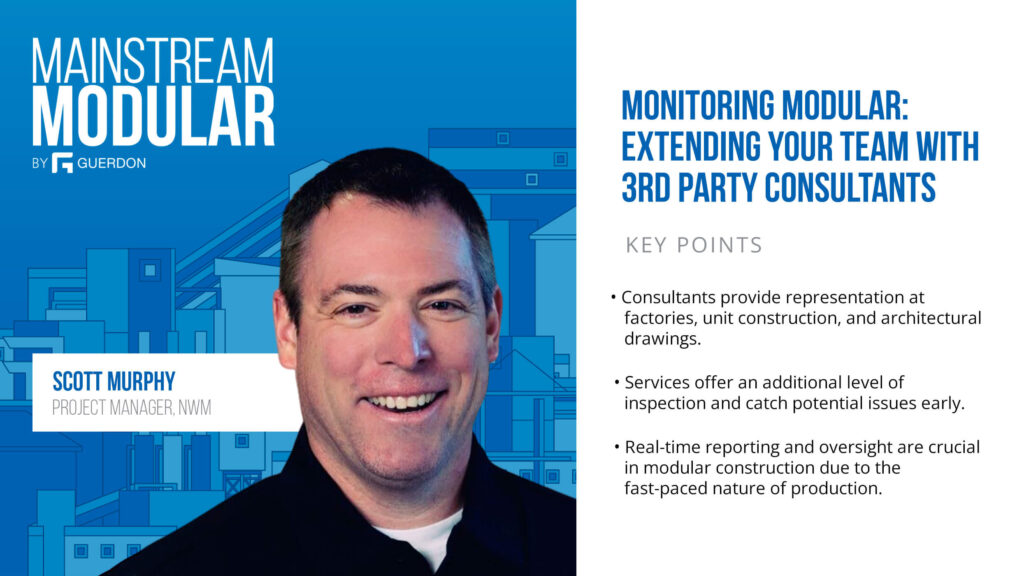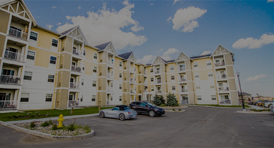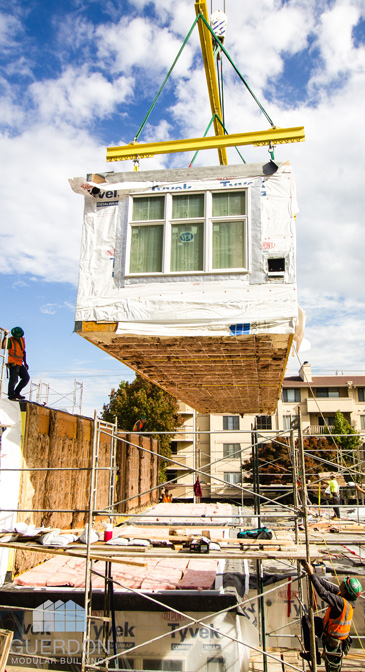
JULY 12, 2023 – The digital economy has disrupted the traditional team structure, forcing businesses to reconsider how they operate. In the age of remote work, the trend of outsourcing to third-party consultants has been gaining momentum, enabling companies to tap into specialized knowledge without the costs associated with full-time employment. One study indicated that 59 percent of businesses use outsourcing to cut expenses, and another 57 percent use it to focus on their core business.
As businesses evolve, how can they leverage third-party consultants to extend their teams? What value can an external consultant bring to the table, and how does this partnership work in practice?
In this episode of “Mainstream Modular” by Guerdon, host Gabrielle Bejarano we explored these questions with Scott Murphy, a modular consultant at Northwest Monitoring. The conversation delved into the role of consultants in team extension, drawing on Murphy’s experiences serving as an extension of the team for developers and banks.
Some topics of conversation that Bejarano and Murphy explored were:
- The importance of third-party consultants as eyes and ears on the ground, offering fresh insights and real-time reporting.
- The role of consultants in releasing units from factories, overseeing changes, and ensuring quality control.
- The value of early involvement of consultants in projects to facilitate better coordination and agility.
Scott Murphy is a renowned modular consultant with Northwest Monitoring. With over a decade in the industry, Murphy has honed his expertise in modular construction, working closely with banks, developers, builders, and school districts. His methodical approach to project execution, combined with his ability to offer real-time reporting, has made him a valuable asset to numerous projects.
 Mainstream Modular Spotify Podcast
Mainstream Modular Spotify Podcast  Mainstream Modular Apple Podcast
Mainstream Modular Apple Podcast
Monitoring Modular: Extending Your Team With 3rd Party Consultants
Transcript:
This is Mainstream Modular, a podcast presented by Guerdon.
Gabrielle: Welcome to another episode of Mainstream Modular. I’m your host, Gabrielle. And today, I’m thrilled to be joined by today’s guest, who’s Scott Murphy. And Scott is an expert in modular construction, serving as a modular consultant. And today we’re going to be learning more about his current role, his background, as well as just how companies can be successfully extending their teams with third-party consultants. So, here today to share his expertise with us is Scott. Scott, welcome.
Scott: Thank you, Gabrielle.
Gabrielle: Of course. Well, let’s start at the beginning. So can you elaborate on your role as a modular consultant? How do you serve as an extension of the team for developers and banks?
Scott: Well, we typically assist banks, developers, builders. We’ve worked with cities, school districts. And what we do is we’ll give these parties representation at the factories. We typically assist with – it typically starts with the assistance of releasing units from the factory deemed acceptable by the standards of the owner, the developer, the builder, and the architect and the modular factory. We do that – we’ll assist with monitoring the units as they’re being built. We’ll review the units with architectural drawings. We’ll assist with a prototype unit and identifying any changes that the team wants, oversee those changes. And when they get to the end of the line and built, we’ll review the unit, punch walk the unit, and sign it off to be shipped. Where we assist with banks is through that process. There’s pay points, and we will sign the unit for payment, verify it’s there, and then report on it.
Gabrielle: Lovely. Well, can you share more about how you offer almost like your eyes and ears at the factory or job site for these teams that we’re talking about?
Scott: What we’ll do is we’ll typically, as the unit’s starting to be built, we will photo and we’ll follow that unit throughout the factory. We’ll do reporting. We’ll do real-time reporting. We’ll assist at OAC meetings, design meetings, and monitor these changes as they go through, the units being built.
Gabrielle: So correct me if I’m wrong, but you are not a code inspector, and so you don’t do official sign-offs. Can you explain this a little bit further and just tell us about the services you do provide?
Scott: Yeah, we’re not a code inspector. The typical sign-offs we do are releasing the unit from the factory. We also, as I said earlier, we’ll assist with the payment process, like an online, offline, as the unit’s being built. When it comes online, there’s a payment. That’s a pay point. We’ll verify that those units have been online, and then we’ll sign any escrow documentation, bank documentation, factory documentation that’s needed for payment.
Gabrielle: Well, can you walk us through, Scott, your journey particularly into this subsection of modular construction and just how your experience you find has benefited your clients?
Scott: Well, we started having been in the industry about 10 years, and our first project or one of our first projects, we were – I was representing the bank, and I would meet the owner of the project to walk the units. And he was flying in from California, getting hotel rooms, was trying to do – walk 30-some units in a day and just offered to help do a punch walk for him. He was super excited and thankful, and we asked the factory and put a process together, and here we are 10 years later, assisting the clients at the factory.
Gabrielle: Well, 10 years, that’s plenty of experience to have a lot of real-life examples to reference. So let’s get a little bit more into the details of maybe some projects that you’ve been a part of where you found the services played a really crucial role. So do you have any real-life examples you could share with us?
Scott: Yeah, I mean, we will review the units as they’re being built. There’s a code review inspector doing it as well. The internal QAQC departments are doing them at the factory. But there’s just another level you come in as a third party. You come in with a fresh set of eyes, review the units, and a vet penetration at a window that’s been reviewed multiple times by multiple engineers, architects, etc., and just a fresh set of eyes asking the question, “Is this correct?”, and discover it’s not correct. We will ideally hopefully catch that as it’s being built, eliminate that from going to site and being a rework cost and potentially cost to the site, delay in schedule. And each project, we learn little nuances of how these are being built and incorporate that into our inspection process at multiple factories. So doing that and then walking that unit for final acceptance, doing a traditional punch walk for fit and finish, etc., and eliminating any unforeseen site rework is really the goal.
Gabrielle: Well, it seems like from what we’ve talked about thus far that your work requires a lot of coordination and agility. So, how do you manage the demands of your schedule?
Scott: A schedule. I set a schedule. And the production of the – the factories have a set of production schedule, we work with that. When a factory sets a production schedule in place, it typically doesn’t change. And we work within those timelines.
Gabrielle: Well, catching issues early on in a lot of these projects within modular construction processes is so incredibly important. So what do you find are the advantages of this approach we’re talking about and why real-time feedback is just so crucial to a lot of these processes?
Scott: Well, factories are producing typically around two units a day. And if there’s something wrong and it’s not getting caught, that problem magnifies two units every day. So that real-time reporting oversight is super important.
Gabrielle: Well, taking – let’s talk about the Riverview project as an example. Could you share some of the key interactions or at least inflection points in the project when maybe you saw the need to get involved? When do you typically get involved? And at what point is your job kind of considered complete when you’re looking at these projects as a whole?
Scott: Well, the earliest we can get involved is always the best because we can assist with – we have relationships with banks. If there’s a financing need, we can give recommendations. We can get a process set up for the bank for payments as the project’s being built. So that really helps if we can get in early and work with the team. And all the design – getting knowledge of where the project started and how it got to the factory and the design changes that are going to be made. So, the earliest we can get involved is the best. Then when the project’s ready to go online, the kickstart meetings or the proto meetings, those are really a milestone to be at where we can kind of get an agreement that this is the unit they’re gonna receive. Everybody’s in agreement and accepting of the quality, and that’s a driver for the project as it’s being built.
Gabrielle: Fantastic. Well, you know, before we close up here, Scott, are there any last thoughts you’d like to leave with our audience? Maybe something you just want to leave them with as well as, you know, how can people reach out if they have more questions about what we talked about today?
Scott: Well, you can reach out to northwestmonitoring.com, and we’ll answer any questions. The factories, we have great relationships with the factories in Boise, Idaho, here. We do other factories as well. So reaching out to them, and we’ll get connected.
Gabrielle: Well, that closes up the conversation for today, so thank you to everyone who joined in on today’s podcast with our guest, Scott Murphy, Modular Consultant. Thank you, Scott. It was a pleasure to have you on the podcast.
Scott: Thank you, Gabrielle.
Gabrielle: Of course. And as always, if you want to learn more, please visit guerdonmodularbuildings.com and look for this podcast wherever it is you get your podcasts at. I’ve been your host, Gabrielle. Thanks for tuning in. I’ll see you next time.
About Guerdon
Guerdon is the leading manufacturer of large-scale, commercial modular construction projects in the Western US and Canada. Guerdon’s modern, innovative modular technology combines on-site construction with precise off-site factory assembly line production. Traditional schedules are shortened substantially because modular units are constructed in our factory-controlled environment while site work and foundation construction are completed concurrently. Guerdon helps developers, architects and general contractors gain greater control over project quality, schedule, and the bottom line. Guerdon’s factory and corporate office are in Boise, Idaho serving 12 western states including California, Colorado, Idaho, Montana, Nevada, North Dakota, South Dakota, Oregon, Utah, Washington, Arizona and Wyoming as well as Canada.








